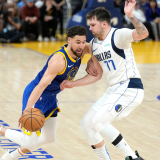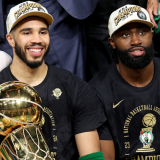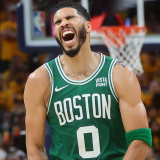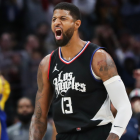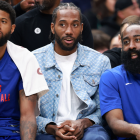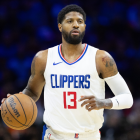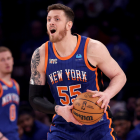
More postseason coverage: Playoff schedule, results | Latest news, notes
The Nets swept the Heat in the regular season.
Big whoop. Call me when that has ever consistently mattered across series, particularly against the Triad in Miami. Go ask Chicago how all that regular season success has worked out.
But when I started looking at the dynamics of the exact things that Brooklyn has used to success, and looked at how they used those things vs. Miami, there are concerning matchup problems for the Heat. Against Toronto, Brooklyn essentially hammered the Raptors in the post. With no viable wing option to defend him, the Nets sent a double, and the adept Brooklyn passing rotations created open three after open three. If they stayed home, Joe Johnson murdered them with post scoring.
But vs. the Heat, that won't be such an advantage, right? The Heat are so much more athletic, it'll be fine, right?
Well, if it is, it'll be because the Heat changed their coverage dramatically. Because the initial results were not good. Not good at all.
The common thought process is that LeBron will resume his battle with Paul Pierce. The savvy veteran is a huge cog in the Nets' offense and when he's going, the Nets are going. That leaves the following options to defend him: Dwyane Wade, Ray Allen, Shane Battier, and Rashard Lewis.
Against Miami, Johnson averaged a 1.077 points per possession mark in the post, well above his season mark of .955. The problems he presents are the result of his combination of skill, speed and strength. It's not just keeping him from powering the ball in in the post, or about staying with him on the spin move. It's about keeping him out of his comfort spots, preventing him from finding the sweet spaces where he can easily score.
Watch how Ray Allen struggles with Johnson's bulk:
Johnson creates separation easily with his shoulder vs. Allen, who doesn't have the length to recover.
Here's Rashard Lewis, a bigger cover, who struggles with Johnson's speed.
And Wade would seem to be the ideal matchup target, but Johnson has size on him and Wade's not the spry chicken he was years ago.
There are different approaches the Heat can take to respond to Allen. The easiest of course is the double. But you have to be selective and careful in how you deploy. Watch what happens when the Heat try and swarm Johnson here:
Battier might be the best option in single coverage. Battier only saw one possession of post defense in the regular season. That might be the best option if the Heat don't want to commit the nuclear option: James. James can shut down Johnson but you risk a. foul trouble and b. taking away James' ability to play free safety, not to mention the risk of Pierce getting hot. Either way, these options are not terrific.
It's not just Johnson that causess trouble, and really Johnson is the matchup that forces the adjustment to open what the Nets really want: open threes. Watch what happens with Andray Blatche on this possession as the Nets' perimeter passing becomes nearly precognizant.
The regular season results don't matter when the Heat and Nets tip off their second-round series Tuesday. But the matchups that make this more favorable for Brooklyn than most of the Heat's opponents are very real. Will the Heat front, risking the flash to the middle which could slice open multiple wounds for the Heat? Will their closeouts and interruptions of passing lanes when the Nets attempt to reverse court with the ball be quicker, leading to the turnovers that Brooklyn avoided in the regular season? These are the things that will decide this series defensively for Miami. It's the biggest key to the series, in all honesty.




